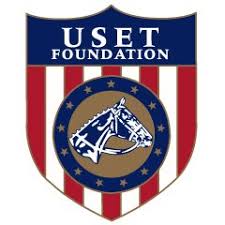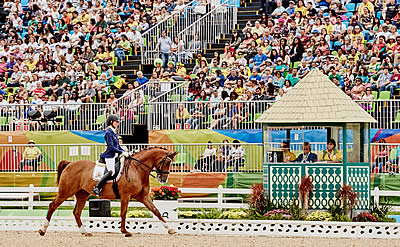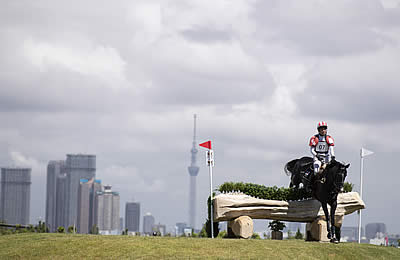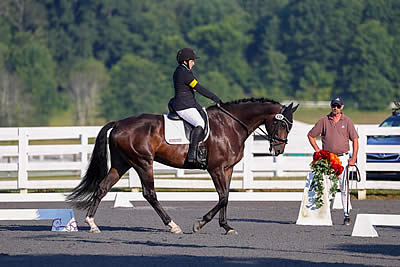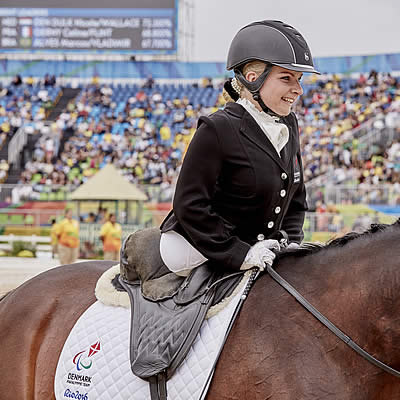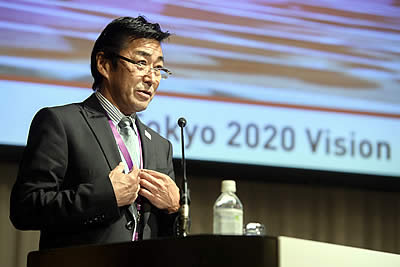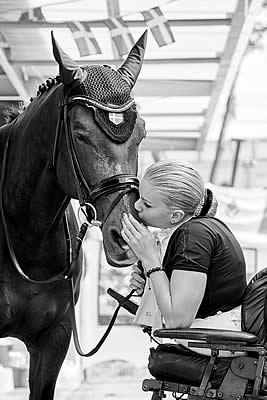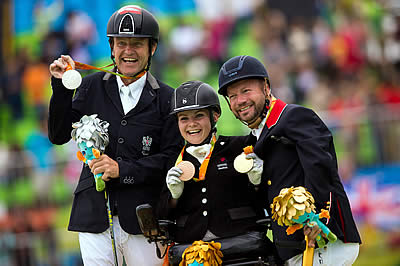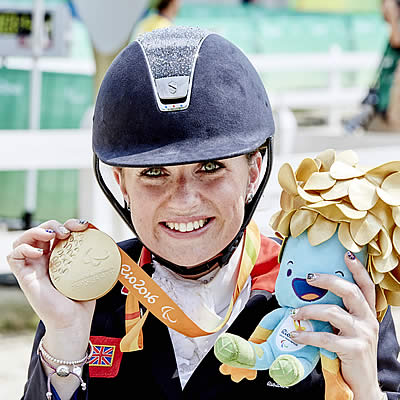Aki Murasato, Executive Director of International Relations with the Tokyo 2020 Organising Committee. (Richard Juilliart/FEI)
Tokyo (JPN), 22 November 2016 – The FEI General Assembly has voted overwhelmingly in favour of the proposed format changes for the Olympic and Paralympic Games in Tokyo 2020, which will now go to the IOC Executive Board for final approval in 2017.
Under the new proposals, the number of athletes in national teams will be reduced to three, and the drop score, which previously allowed for a team’s worst score to be discarded, will be removed. The use of a reserve combination for teams will remain in place, but will be even more important and will be a key element in ensuring horse welfare.
A total of 11 of National Federations, out of 107 represented, voted against the proposal – Albania, Bulgaria, France, Germany, Latvia, Luxembourg, Monaco, New Zealand, the Netherlands, Romania and Switzerland.
Voting on the proposed sport-specific changes to the three individual Olympic disciplines – Jumping, Dressage and Eventing – was unanimously in favour.
The vote on the Paralympic formats saw one National Federation – Great Britain – against the proposed changes.
“This was a really important vote for the future of our sport if we are to increase universality in accordance with the recommendations of Olympic Agenda 2020,” FEI President Ingmar De Vos said after the vote.
“We need to increase the number of participating nations at the Olympic Games but within our existing quota of 200. Reducing team members to three per nation was probably the only way to boost the number of flags. Of course this now has to be approved by the IOC, but it opens the door to countries that previously could only see the Olympics as a distant dream.
“There were some National Federations that didn’t agree with the proposal, but that’s all part of the democratic process. Now we need to work together to make this a success.”
The proposed changes are detailed below:
Jumping
- Teams of three horse/athlete combinations per nation, plus one reserve combination, no drop score
- 20 teams (60 horse/athlete combinations)
- 15 slots for nations not qualified with a team (maximum one horse/athlete combination per nation)
- Individual event will now take place before Team event
- Cut-off score: the exact cut-off and resulting penalty will be finalised in the Olympic Regulations
- The exact penalty for any horse/athlete combination that is eliminated, or does not complete their round for any reason, will be finalised in the Olympic Regulations
Dressage
- Teams of three horse/athlete combinations per nation, no drop score
- Each directly qualified team may bring a reserve rider/horse combination, or horse only
- One individual per nation not represented by a qualified team (no composite teams)
- Determine Team medals solely through results of Grand Prix Special (no longer a combination of Grand Prix and Grand Prix Special scores)
- Introduce new “heat system” (including “lucky losers”) for Grand Prix: 18 individuals to qualify from Grand Prix to Grand Prix Freestyle (best two from each of the 6 heats, plus the next 6 with the best overall results)
- 8 top teams (24 starters) from Grand Prix to qualify for Grand Prix Special
- Introduce new system for starting order in Grand Prix
- Conduct Grand Prix Special to music
Eventing
- Teams of three horse/athlete combinations per nation, no drop score
- One reserve combination per team will be allowed. The reserve combination is an important element of the proposal in order to preserve horse welfare. If a reserve combination is substituted, it will incur a penalty for the team. The exact penalty will be finalised in the Olympic Regulations
- Maximum of two individuals per nation not represented by a team
- Order of tests to remain unchanged (1st Dressage; 2nd Cross Country; 3rd Jumping Team; 4th Jumping Individual)
- Olympic Eventing to take place over three days (Dressage test reduced to one day)
- Technical level of the three tests to be defined as the “Olympic level”: Dressage and Jumping 4*; Cross Country: 10-minute optimum time, 45 jumping efforts, and 3* technical difficulty
- Qualification of athletes/horses to be achieved on the same Cross Country technical level to ensure implementation of the recommendations of the FEI Independent Audit in Eventing
- For the purpose of the Team classification only: any horse/athlete combinations not completing a test can continue to the next test if accepted as fit to compete at the relevant Horse Inspection
- For the purpose of the Team classification only: penalties for the non-completion of a test for any reason, Dressage =100 points, Cross Country = 150, Jumping = 100
- Rules for the Individual event remain unchanged
Para-Equestrian Dressage
- Teams of three horse/athlete combinations per nation, no drop score
- Each directly qualified team is entitled to bring four horse/athlete combinations, of which three will have to be declared to compete on the team after the Individual Championships test, in which all four will compete as Individuals.
- Maximum of two individuals per nation not represented by a team (no composite teams)
- Determine Team medals solely through results of Team test (no longer a combination of Team and Individual test scores)
- Top 8 per grade from the Individual test to qualify for the Freestyle test
- Order of tests: Individual Championship test, Team test, Freestyle
- Team test to be set to music
FEI President Focuses on Unique Qualities of Equestrian Sport at FEI General Assembly
FEI President Ingmar De Vos opened the FEI General Assembly in the Japanese capital Tokyo, delivering the keynote address to almost 300 delegates and focusing on the unique qualities of equestrian sport.
“We all agree that we have the greatest sport on earth and this is for many reasons,” the FEI President said. “We excel when it comes to gender equality, but what makes our sport so great is the unique bond between human and animal, between man and horse. But it is this same unique value which makes our sport vulnerable.
“With the growth of our sport grows also our responsibility to continuously ensure the welfare of our athletes in order to safeguard the integrity of the sport at all times.
“We need to insist on a strict application of our rules. They need to be transparent, clear and not open for interpretation. We need to be irreproachable in our stance and our outlook. These are big challenges.
“There are organisations – increasing in number – that are of the opinion that horses should not be competed or even ridden!
“We need to show them – and the world – that we are not only dedicated to horse welfare but that we are the leaders in that domain. And we also need to educate – to show just how much we do and how committed the equestrian community is to horse welfare. Ignorance creates fear. So we need to show that a true partnership is about trust and respect so that we can bridge that gap and bring people closer to our sport.”
During a packed morning agenda, delegates voted on a number of important issues, including the Olympic and Paralympic format change proposals (see FEI press release here), formats for the FEI World Equestrian Games™ 2018 and other sport specific matters. Full details of the main decisions made at the FEI General Assembly 2016 are here.
The afternoon featured a series of presentations, including an update on the Tokyo 2020 Olympic and Paralympic Games from Aki Murasato, Executive Director of International Relations with the Tokyo 2020 Organising Committee.
Mark Bellissimo, creator of the Tryon International Equestrian Center, also addressed delegates, providing an update on the venue that was earlier this month announced as the host for the FEI World Equestrian Games™ 2018.
Speaking directly to the FEI President, Mark Bellissimo said: “We want to let you know that we appreciate how important this event is to the FEI, and how important it is both for us as organisers and the community that we work within. We will do our best not to let you down.”
Nai Yue Ho (SIN), outgoing Chair of FEI Regional Group VIII, who was celebrating his birthday, was made an Honorary Bureau Member of the FEI. And prior to closing remarks, the FEI President thanked the Japan Equestrian Federation (JEF) for their hospitality, commenting on the fact that it had been 25 years since the FEI General Assembly had been held in Tokyo, and in the same hotel. He then made a presentation to Tsunekazu Takeda, President of the Japanese Olympic Committee and Vice-President of the Tokyo 2020 Organising Committee, and to JEF Secretary General Dr Yasuhiko Haruta, who also collected a special plaque on behalf of JEF President Dr Genshitsu Sen.
In his closing address, the FEI President said: “This was a very important General Assembly. We took crucial decisions for the future of our sport and I understand that not everybody was happy, but we followed a very democratic process and in the end there was a clear majority. There are no winners or losers in this debate. These new formats give us a huge responsibility and failure is not an option, so we need to work together with all our stakeholders to prepare for Tokyo 2020.”
Timeline for finalisation of the Tokyo 2020 Olympic formats:
February 2017 – FEI proposals go to the IOC Executive Board
May 2017 – IOC Programme Commission make recommendations to the IOC Executive Board
July 2017 – IOC Executive Board decides on events and quotas
November 2017 – FEI General Assembly in Montevideo (URU) finalises the proposal for qualification procedures (quota distribution and eligibility)
FEI Media Contacts:
At FEI General Assembly, Tokyo:
Grania Willis
Director Press Relations
grania.willis@fei.org
+41 787 506 142
Ruth Grundy
Manager Press Relations
Email: ruth.grundy@fei.org
Tel: +41 787 506 145
At FEI headquarters, Lausanne (SUI):
Shannon Gibbons
Manager Press Relations
shannon.gibbons@fei.org
+41 78 750 61 46
Leanne Williams
Manager Press Relations
leanne.williams@fei.org
+41 79 314 24 38
